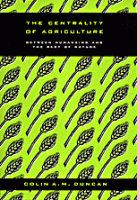 Bridging the gap between political economy and ecology, The Centrality of Agriculture is a critical review of the history of capitalism and socialism in relation to agriculture. Colin Duncan argues that the important role of agriculture has been overlooked during the last two centuries. It must be restored to a central place in society.
Bridging the gap between political economy and ecology, The Centrality of Agriculture is a critical review of the history of capitalism and socialism in relation to agriculture. Colin Duncan argues that the important role of agriculture has been overlooked during the last two centuries. It must be restored to a central place in society.
Using ecological, historical, humanist, institutionalist, and Marxist methodologies, Duncan argues that the entire project of developing the theory of political economy has been seriously sidetracked by industrialism. Using England as a case study he shows that the relationship between modernity and agriculture need not be uncomfortable and suggests ways in which the original socialist project can be rejuvenated to make it both more feasible and more attractive.
Duncan concludes that no sustainable human future can be conceived unless and until the centrality of agriculture is properly recognized and new economic institutions are developed that will encourage people to take care of their landscapes.
